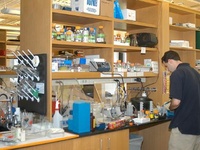“One benefit of having a former cabinet member as University president is the hope that he would deploy his political resources to the benefit of his students,” el-Gaili wrote.
A Supporting Role
Rather than putting the full weight of his Washington clout behind these issues from the start, Summers’ role throughout the year has been to set the tone for a cautious response.
According to Casey, Summers has been working closely with Vest and other university presidents in the Association of American Universities (AAU) to seek solutions to problems that rose as a result of post-Sept. 11 legislation.
He has asked Casey and other University experts to make presentations on their concerns and progress to several facets of the Harvard community.
But while Vest has become a highly-knowledgeable activist on these matters, often taking the role of explaining the problems to a roomful of his peers, Summers has delegated much of this responsibility.
In a January interview, after faculty members had raised concerns about the FBI’s ability to request the e-mail or library records of a foreign-born scholar, Summers expressed uncertainty about whether such a request had ever been made at Harvard.
When asked about the University’s guiding philosophy on such matters in the same interview, Summers said, “The guiding philosophy is that Harvard complies with the law.”
And while Casey says that IPASS has been one of the top items on Harvard’s agenda in D.C. this year, Summers could not provide a response when asked about the program in a recent interview.
Responsibility for issues of post-Sept. 11 legislation at Harvard rests on the shoulders of a few individuals—experts like Casey and Acting General Counsel Robert W. Iuliano ’83—who have led a cautious administration through the brambles of recent government regulations.
With much of the post-Sept. 11 legislation targeted at scientific research, MIT’s president may feel a stronger need to become personally involved, since classified work is undertaken there but not at Harvard, says State Department spokesperson Stuart Patt.
“I think the situation for MIT is slightly different in that Harvard is more liberal arts-oriented than MIT,” Patt says.
But the relative silence of Harvard’s leadership can also be explained by a strategy of diligent compliance—a strategy that Casey says has begun to bear fruit this spring, as Washington has recently been more amenable to Harvard’s concerns.
He says this is largely the result of a relationship of trustworthiness that the University has worked to build.
And the quiet efforts that the University has undertaken to examine and understand the issues arising from recent legislation are about to pay off.
Read more in News
Pataki: 'Yale is Going to Crush Harvard'













